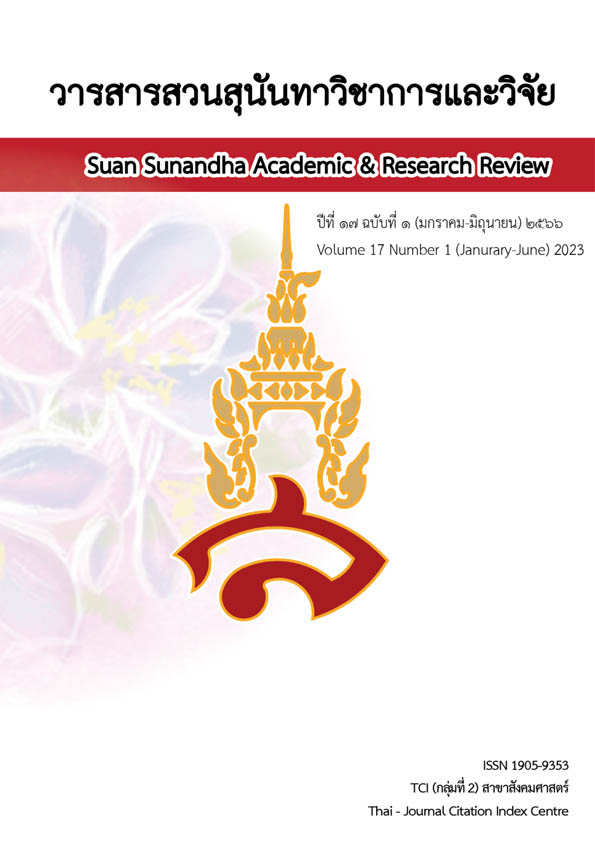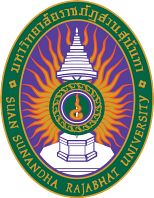ซีเรียสเกมกับการส่งเสริมความเป็นพลเมืองดิจิทัล สำหรับเด็กและเยาวชน
คำสำคัญ:
พลเมืองดิจิทัล, ซีเรียสเกมบทคัดย่อ
ในยุคที่สื่อเทคโนโลยีมีบทบาทและเป็นสิ่งจำเป็นต่อการดำเนินชีวิต พลเมืองในยุคปัจจุบันจึงจะต้องเป็นพลเมืองที่มีความสามารถในการเข้าถึง จัดการความเข้าใจ รวบรวม ประเมิน โดยคำนึงถึงความปลอดภัย รวมทั้งการมีความรับผิดชอบ มีจริยธรรมในการใช้เทคโนโลยี นั้นคือการมีคุณลักษณะความเป็นพลเมืองดิจิทัล ได้แก่ เคารพตนเองและเคารพผู้อื่น พัฒนาตนเองและมีความสัมพันธ์กับผู้อื่น ปกป้องตนเองรวมทั้งปกป้องผู้อื่น ซึ่งจำเป็นอย่างยิ่งที่จะต้องได้รับการส่งเสริมอย่างมีประสิทธิภาพ อันจะทำให้พลเมืองดิจิทัลมีความสามารถที่จะใช้เทคโนโลยีได้อย่างชาญฉลาดและมีความรับผิดชอบต่อสังคม ควรเริ่มปลูกฝังตั้งแต่ในวัยเด็ก โดยการส่งเสริมทักษะต่างๆจะต้องใช้เครื่องมือที่สร้างความสนุกสนานรวมเข้ากับการเรียนรู้ โดยแนวทางหนึ่งนั้นคือ การใช้ ซีเรียสเกม (Serious Game) เป็นเกมที่ต้องมีการคิด หรือตริตรองด้วยความจดจ่อในกิจกรรมที่จัดทำขึ้น โดยยังมีความสนุกสนานและได้รับความรู้ในเรื่องนั้นๆ ทั้งยังส่งเสริมทักษะที่เกี่ยวข้องกับการสร้างพฤติกรรมและการแก้ปัญหาที่ต้องการเมื่อเผชิญหน้ากับสถานการณ์ที่เกิดขึ้นในโลกดิจิทัล บทความนี้มีวัตถุประสงค์เพื่อเสนอแนวทางการการนำซีเรียสเกมมาส่งเสริมความเป็นพลเมืองดิจิทัล สำหรับเด็กและเยาวชน ส่งเสริมการเรียนรู้และความจำสร้างเสริมแรงจูงใจ ป้องกันภาวะผิดปกติทางใจอันเนื่องมาจากสถานการณ์ที่พบเจอในชีวิตประจำวันบนโลกออนไลน์
เอกสารอ้างอิง
Betz, J. A. (1995). Computer game: Increase Learning and Thinking in an Interactive Multidisciplinary Enviroment. Retrieved October 19, 2022, from http://www.fact.suny.edu/
cit95/abstracts.html
Boughzala, I., Bououd, I., & Michel, H. (2013). Characterization and Evaluation of Serious Games: A Perspective of Their Use in Higher Education. System Sciences (HICSS), 2013 46th Hawaii International Conference (pp. 843-852). Hawaii: IEEE Computer Society. doi:DOI 10.1109/HICSS.2013.620
Chumphet, W. (2020). The development of an educational game system to promote learning in the classroom. Journal Southern Technology, 13(2), 114 (In Thai).
Digital Intelligence (DQ) . (2017). A Conceptual Framework & Methodology for Teaching Measuring Digital Citizenship. Retrieved November 10, 2022, from https://www.dqinstitute.org/
wp-content/uploads/2017/08/DQ-Framework-White-Paper-Ver1-31Aug17.pdf
DQ Institute Leading Digital Education, Culture, and Innovation. (2019). Digital intelligence: DQ Global Standards Report 2019 Common Framework for Digital Literacy, Skills and Readiness. Retrieved October 19, 2022, from https://www.dqinstitute.org/wp-content/uploads/2019/11/ DQGlobalStandardsReport2019.pdf
Global Digital Citizen Foundation. (2015). digital-citizenship-school-program. Retrieved October 19, 2022, from https://globaldigitalcitizen.org/ International Society for Technology in Education. (ISTE) (2015). Available October ,19, 2022 from : http://www.iste.org/
standards/iste-standards/standards-for-students
Hurley, L. (2017). How to make a videogame (With no experience). Retrieved from Gamesradar: https://www.gamesradar.com/how-to-make-a-videogame-with-no-experience/
Inthanon, S. (2018). Digital Intelligence. Bangkok: Foundation for the Promotion of Children and Youth Media (TSG) (In Thai).
Jeannette, A., Stephen, S., & Aleksandra, D. (2015). Future Delta 2.0 - An Experiential Learning Context for a Serious Game about Local Climate Change. SIGGRAPH Asia 2015 Symposium on Education. Kobe : ACM Digital Library.
Marsden, J. (2013). Designing an awesome video game. Retrieved from gamedeveloper: https://www.gamedeveloper.com/design/designing-an-awesome-video-game
Ministry of Digital Economy and Society Office of the National Digital Economy and Society Commission. (2021). Media and Information Literacy Summary Survey Report Thailand 2019. Bangkok: Office of the National Digital Economy and Society Commission. Ministry of Digital Economy and Society (In Thai).
Ministry of Education. (2017). Learning Standards and Indicators for Mathematics,Science, and Geography Learning Subjects in Social Studies, Religion, and Culture Learning Subject Groups (Revised Edition 2017, Basic Education Core . Bangkok: Agricultural Cooperative Assembly of Thailand (In Thai).
Ministry of Education Singapore. (2014). Student Development Curriculum Division Syllabus Cyber Wellness Secondary. Singapore: Ministry of Education.
Ministry of Information and Communication Technology. (2016). Digital Development Plan for Economy and Society. Bangkok: Ministry of Information and Communication Technology (In Thai).
Muduchit, P. (2013). Internet use affects risky behavior among adolescents in Bangkok. Bangkok: Ramkhamhaeng University (In Thai).
Park, Y. (2016). 8 digital life skills all children need - and a plan for teaching them. Retrieved November 10, 2022, from https://www.dqinstitute.org/dqframework/#digital_intelligence
Pedkaew, A. (2022). Survey on the situation of children and online threats. The Secretariat of the Prime Minister. Bangkok (In Thai).
Pramote, P. (2018). The development of mathematics learning activity packs using a cooperative learning model coupled with games to promote learning outcomes and desirable characteristics in mathematics. For students in grade 5. Master of Education thesis. Chiang Mai : Chiang Mai Rajabhat University (In Thai).
Ribble*, M. (2019). Digital Citizenship. Retrieved from http://www.digitalcitizenship.net
Ribble, M., & Bailey, G. (2007). Digital Citizenship in Schools. Retrieved from https://epale.ec.europa.eu/
sites/default/files/digcit-excerpt.pdf
Suwankanit, T. (2017). Designing a card game for understanding curriculum learning. Research on Innovation to Drive Economy and Society (pp. 1700-1715). Phitsanulok: Naresuan University (In Thai).
UNESCO. (2015). Fostering Digital Citizenship through Safe and Responsible Use of ICT. Bangkok: UNESCO.
Wattanasoontorn, V., Boada, I., Garcia, R., & Sbert, M. (2013). Serious games for health. Entertainment Computing, 4(4), 231-247. doi:10.1016/j.entcom.2013.09.002
Wongkitrungruang, W. (2018). Digital Citizen Handbook. Bangkok: Digital Economy Promotion Agency digital ministry for the economy and society (In Thai).
ดาวน์โหลด
เผยแพร่แล้ว
รูปแบบการอ้างอิง
ฉบับ
ประเภทบทความ
สัญญาอนุญาต
ลิขสิทธิ์ (c) 2023 สถาบันวิจัยและพัฒนา มหาวิทยาลัยราชภัฎสวนสุนันทา

อนุญาตภายใต้เงื่อนไข Creative Commons Attribution-NonCommercial-NoDerivatives 4.0 International License.
บทความที่ได้รับการตีพิมพ์เป็นลิขสิทธิ์ของ สถาบันวิจัยและพัฒนา มหาวิทยาลัยราชภัฎสวนสุนันทา
ข้อความที่ปรากฏในบทความแต่ละเรื่องในวารสารวิชาการเล่มนี้เป็นความคิดเห็นส่วนตัวของผู้เขียนแต่ละท่านไม่เกี่ยวข้องกับมหาวิทยาลัยราชภัฎสวนสุนันทา และคณาจารย์ท่านอื่นๆในมหาวิทยาลัยฯ แต่อย่างใด ความรับผิดชอบองค์ประกอบทั้งหมดของบทความแต่ละเรื่องเป็นของผู้เขียนแต่ละท่าน หากมีความผิดพลาดใดๆ ผู้เขียนแต่ละท่านจะรับผิดชอบบทความของตนเองแต่ผู้เดียว






